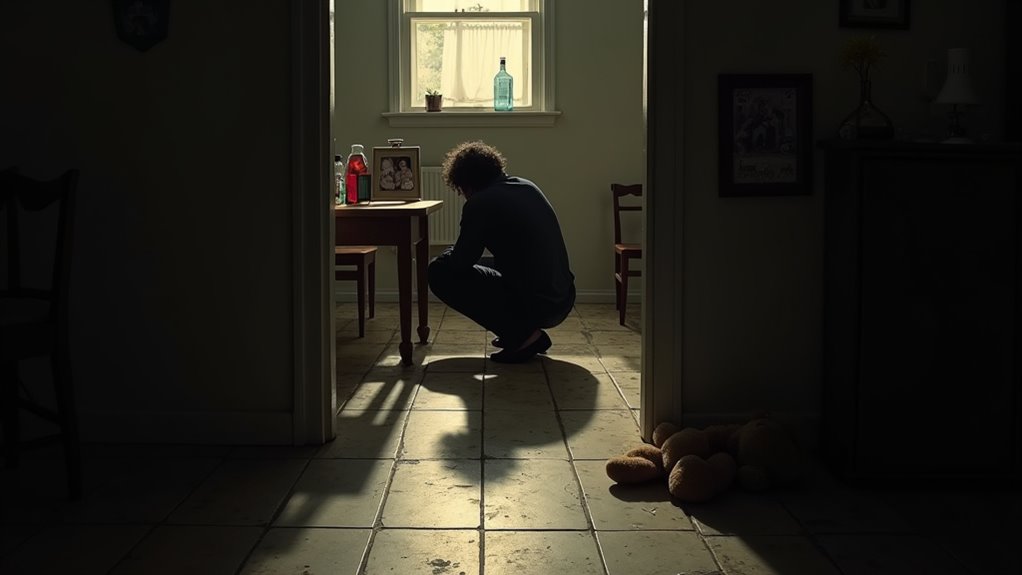Addiction systematically damages relationships through five key warning signs: broken trust, emotional distance, destructive conflicts, financial strain, and enabling patterns. You’ll notice your partnership suffering as substance use takes priority over intimacy, honest communication, and shared responsibilities. While these challenges can feel daunting, there’s hope through specialized couples therapy and all-encompassing recovery programs. Understanding how addiction affects relationships is your initial step in the direction of healing together and rebuilding a stronger foundation.
The Breakdown of Trust and Honest Communication

When addiction infiltrates a relationship, the breakdown of trust and honest communication often occurs gradually, eroding the foundation that healthy partnerships depend on. You’ll notice increasing patterns of deception as your partner prioritizes substance use over shared commitments. They may lie about their whereabouts, hide financial transactions, or deny the severity of their usage despite clear evidence. Intense emotions surface during confrontations about the addiction, making productive discussions nearly impossible.
The neglect of shared responsibilities becomes more apparent as addiction takes hold. Bills go unpaid, household duties get ignored, and promises remain unfulfilled. These behaviors create significant financial strain that can devastate relationships and families. Your partner’s disregard for your feelings intensifies through missed vital events, forgotten conversations, and dismissed concerns. Intimate partner violence becomes a heightened risk as substance abuse continues to dominate the relationship.
The cycle of broken trust accelerates when confronted with evidence of their addiction they might respond with anger, deflection, or gaslighting, making you question your own judgment and observations.
Emotional Distance and Isolation Between Partners
As addiction tightens its grip on a relationship, emotional distance often emerges as one of its most devastating consequences. You’ll notice diminished emotional intimacy as your partner prioritizes substance use over shared experiences and meaningful connection. The natural flow of affection and support begins to wane, replaced by uncertainty and isolation. Partners often find themselves living parallel lives as addiction creates barriers to genuine connection.
This impaired relational bonding manifests through reduced quality time together, less emotional vulnerability, and a breakdown in mutual support. Some individuals may develop low self-esteem and difficulty establishing healthy boundaries in their relationships. The relationship often develops a vicious cycle where substance use leads to conflict, which then triggers more substance use. You might find yourself walking on eggshells, struggling to maintain any genuine connection as substances become your partner’s primary source of comfort.
To rebuild these damaged bonds, consider seeking professional help through couples therapy, establishing clear boundaries, and joining support groups. Remember, healing is possible when both partners commit to recovery and emotional reconnection.
Rising Tensions and Destructive Conflict Patterns

Many relationships affected by addiction experience a destructive pattern of escalating tensions and hostile interactions. You’ll notice how substance use triggers mood swings and irritability, leading to frequent arguments and impaired problem solving skills. Partners often become obsessively focused on the drinking behavior, creating what experts call unhealthy preoccupation patterns.
When conflicts arise, defensive language and contempt replace healthy communication, creating a dangerous cycle where both partners feel increasingly anxious and overwhelmed. The person struggling with addiction may find subconscious comfort in instability, perpetuating the cycle of destructive behaviors.
This tension often results in the erosion of intimacy as your relationship becomes organized around managing the addiction rather than nurturing your connection. You might find yourself trapped in a feedback loop where relationship stress triggers substance use, which then causes more conflict.
Understanding this pattern is essential approximately 40-60% of intimate partner violence involves substance use, highlighting how these destructive cycles can escalate into serious harm.
The Hidden Costs of Enabling and Financial Stress
The financial devastation of addiction extends far beyond the direct costs of substances. When you’re supporting a loved one with addiction, you’ll often find yourself accumulating debt and watching credit scores plummet as resources are drained. The impact ripples through every aspect of financial stability. Research shows that addiction contributes to $400 billion annually in combined healthcare and productivity losses across the nation. Individuals struggling with addiction often experience severe job instability due to poor performance and attendance issues. Substance abuse significantly impacts families through criminal justice expenses, including costs of legal representation and incarceration.
| Impact | Individual Cost | Family Effect |
|---|---|---|
| Short-term | Missed bill payments | Depleted savings |
| Mid-term | Damaged credit scores | Strained relationships |
| Long-term | Limited employment | Generational poverty |
| Recovery | Treatment expenses | Financial rebuilding |
You’ll notice money disappearing into a bottomless pit: legal fees, bail bonds, and emergency loans become commonplace. What starts as occasional financial help often transforms into a pattern of enabling that threatens everyone’s financial security. Breaking this cycle requires establishing firm boundaries while supporting recovery through healthier means.
Finding Hope: Recovery Strategies for Couples

When couples face addiction together, recovery becomes a shared expedition that can actually strengthen their relationship. Through Behavioral Couples Therapy (BCT), you’ll learn to address addiction’s impact while building healthier communication patterns and mutual accountability. Specialized treatment centers provide comprehensive care initiatives that equip both partners with essential skills for maintaining sobriety. Family counseling approaches show superior outcomes compared to individual therapy alone. Treatment programs typically lasting 30 to 90 days allow couples to develop sustainable behavioral changes.
You’ll find that joint participation in rehab programs substantially improves success rates, combining individual and couple-based therapies to tackle both personal and relational challenges. The process includes developing personalized relapse prevention strategies and establishing joint aftercare plans that maintain long-term recovery.
Frequently Asked Questions
How Long Does It Typically Take for Relationships to Heal After Addiction?
Your relationship restoration timeline after addiction typically spans 2-5+ years, though it varies based on personal circumstances.
You’ll find the primary year focuses heavily on establishing sobriety, while trust rebuilding often requires 6-12 months of consistent behavior.
Your addiction recovery duration profoundly impacts healing you’ll need to demonstrate sustained sobriety, participate in therapy, and maintain open communication.
Can Couples Therapy Work if Only One Partner Seeks Treatment?
While couples therapy can offer some benefits with one partner’s participation, it’s most effective when there’s joint commitment from both partners. You’ll find limited success if only one person is engaged, as relationship healing requires open communication and mutual effort.
If your partner won’t attend, you can still benefit from individual therapy to work on your own patterns and boundaries. Consider starting there while leaving the door open for future couples work.
What Are the Success Rates for Relationships Surviving Addiction Recovery?
While exact success rates vary, you’ll find that relationship dynamics substantially improve when both partners actively participate in recovery. Partner involvement in treatment can reduce substance use by approximately 3 weeks per year, and couples who engage in behavioral therapy together show stronger outcomes.
You’ll have better chances of relationship survival through coordinated care, joint counseling sessions, and mutual support systems. Professional guidance can help you address codependency and rebuild trust effectively.
Should Children Be Told About a Parent’s Addiction Struggles?
Yes, you should tell children about a parent’s addiction using developmentally-appropriate open communication. Research shows that kids often sense when something’s wrong, and keeping secrets can increase their anxiety and confusion.
When you provide family education and honest explanations, you’ll help them understand it’s not their fault and build trust. Work with mental health professionals to guide these conversations and guarantee you’re supporting your child’s emotional needs effectively.
When Is Separation a Better Choice Than Trying to Repair the Relationship?
You should consider separation when reconciliation becomes impossible due to ongoing safety risks or severe trust violations.
If your partner repeatedly refuses treatment, maintains dangerous behaviors, or puts you or your children at physical/emotional risk, it’s time to prioritize personal safety.
While ending a relationship is difficult, staying in an actively harmful situation can lead to trauma and declining mental health.
Trust your instincts when they’re telling you enough is enough.





